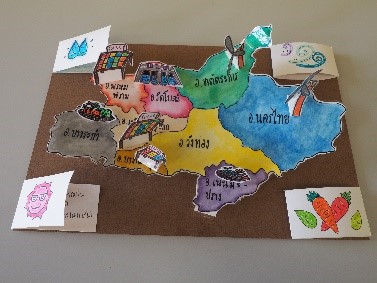
An Action Research on Enhancing Grade 10 Student Creative Thinking Skills using Argument-driven Inquiry Model in the Topic of Chemical Environment
Abstract
Full Text:
Download PDFReferences
Awang, H., & Ramly, I. (2008). Through Problem-Based Learning : Pedagogy and Practice in the Engineering Classroom. International Journal of Human and Social Sciences, 2(4), 18–23.
Berland, L. K., & Reiser, B. J. (2011). Classroom communities’ adaptations of the practice of scientific argumentation. Science Education, 95(2), 191–216. https://doi.org/10.1002/sce.20420
Erduran, S. (2007). Methodological foundations in the study of argumentation in science classrooms. Argumentation in science education.
Greenstein, L. (2012). Assessing 21st century skills : a guide to evaluating mastery and authentic learning. Corwin Press.
Kemmis, S. (2009). Action research as a practice‐based practice. Educational Action Research, 17(3), 463–474. https://doi.org/10.1080/09650790903093284
Kemmis, S., McTaggart, R., & Nixon, R. (2014). The action research planner : doing critical participatory action research. singapore.
Krippendorff, K. (2013). Content analysis : an introduction to its methodology. SAGE.
Kuhn, D., & Udell, W. (2011). The development of argument skills. Child Development, 74(5), 1245–60. https://doi.org/10.1111/1467-8624.00605
Norris, S., Philips, L., & Osborne, J. (2007). Scientific inquiry: The place of interpretation and argumentation. Science as Inquiry in the Secondary Setting. Retrieved from http://www.nsta.org/store/download.aspx?l=8JgS7/JBvFIPibfC0TL4iw==
P21 partnership for 21st century learning-Creativity and Innovation. (n.d.). Retrieved September 8, 2017, from http://www.p21.org/about-us/p21-framework/262
Resnick, M., & Mitchel. (2007). All I really need to know (about creative thinking) I learned (by studying how children learn) in kindergarten. In Proceedings of the 6th ACM SIGCHI conference on Creativity & cognition - C&C ’07 (pp. 1–6). New York, USA: ACM Press. https://doi.org/10.1145/1254960.1254961
Sampson, V., & Grooms, J. (2010). Generate an argument: An instructional model. The Science Teacher, 77(5), 32–37. Retrieved from http://search.proquest.com/openview/0abe26442b84981b65edac230cccd331/1?pq-origsite=gscholar&cbl=40590
Sampson, V., Grooms, J., & Walker, J. P. (2011). Argument-Driven Inquiry as a way to help students learn how to participate in scientific argumentation and craft written arguments: An exploratory study. Science Education, 95(2), 217–257. https://doi.org/10.1002/sce.20421
Sampson, V., & Walker, J. P. (2012). Argument-Driven Inquiry as a Way to Help Undergraduate Students Write to Learn by Learning to Write in Chemistry. International Journal of Science Education, 34(10), 1443–1485. https://doi.org/10.1080/09500693.2012.667581
Stéphan, V.-L. (n.d.). Teaching, assessing and learning creative and critical thinking skills in education. Retrieved October 13, 2017, from http://www.oecd.org/education/ceri/assessingprogressionincreativeandcriticalthinkingskillsineducation.htm
Thompson, T. (2017). Teaching Creativity Through Inquiry Science. Gifted Child Today, 40(1), 29–42. https://doi.org/10.1177/1076217516675863.
Van Eemeren, F. H. (1995). A world of difference: The rich state of argumentation theory. Informal Logic, 17(2), 144–158.
DOI: https://doi.org/10.17509/jsl.v2i1.11995
Refbacks
- There are currently no refbacks.
Copyright (c) 2018 Authors
License URL: https://creativecommons.org/licenses/by-sa/4.0/


Jl. Dr. Setiabudhi 229 Bandung 40154, West Java, Indonesia











